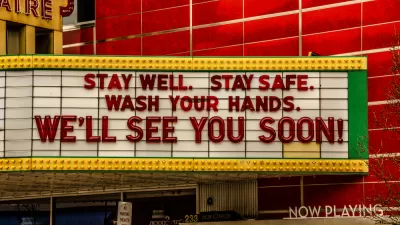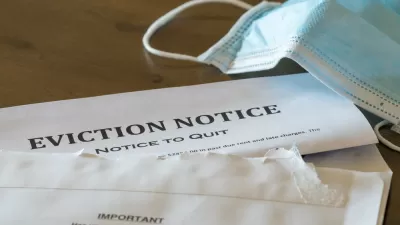The Eviction Lab at Princeton University is using data to tell the story of thousands of tenant evictions. Matthew Desmond, the Lab's director, shares stories of tenants and insights about the compounding danger of mass evictions and COVID-19.

Matthew Desmond, director of the Eviction Lab at Princeton University, understands the devastating impact of eviction during a time when unemployment has reached levels to rival those seen during the Great Depression. Demond's recent opinion piece describes the real-life consequences of insufficient federal rental aid support and a housing crisis that forces the majority of sub-poverty line tenants to allocate over half of their income to rent.
During the coronavirus lockdown, the constant threat is simply heavier. "During a pandemic that forcefully links our health to our homes, eviction will help spread the virus, as displaced families crowd into shelters, double up with relatives and friends, or risk their health in unsafe jobs to make rent or pay for moving expenses," writes Desmond.
Data recently released by Desmond's team at Princeton's Eviction Lab shows that of the 1,795 new eviction cases filed in Phoenix during the month of July, about 18% of cases were caused by an unpaid sum of $500 or less. Through the Lab's research, Desmond knows very well the weight of the monthly rent payment for families across the country:
Rent — it’s the greediest of bills. For many families, it grows every year, arbitrarily, almost magically, not because of any home improvements; just because. And unlike defaulting on other bills, missing a rent payment can result in immediate and devastating consequences, casting families into poverty and homelessness. If you can’t afford enough food, you can usually qualify for food stamps. If you miss a mortgage payment, you typically have 120 days before your bank can initiate the foreclosure process. But if you can’t pay your rent, you can lose your home in a matter of weeks.
What we need, says Desmond, is not mass eviction, but effective rental assistance. Congress needs to step up to protect Americans through substantive action and generous federal benefits, adds Desmond.
FULL STORY: The Rent Eats First, Even During a Pandemic

Study: Maui’s Plan to Convert Vacation Rentals to Long-Term Housing Could Cause Nearly $1 Billion Economic Loss
The plan would reduce visitor accommodation by 25,% resulting in 1,900 jobs lost.

North Texas Transit Leaders Tout Benefits of TOD for Growing Region
At a summit focused on transit-oriented development, policymakers discussed how North Texas’ expanded light rail system can serve as a tool for economic growth.

Why Should We Subsidize Public Transportation?
Many public transit agencies face financial stress due to rising costs, declining fare revenue, and declining subsidies. Transit advocates must provide a strong business case for increasing public transit funding.

How to Make US Trains Faster
Changes to boarding platforms and a switch to electric trains could improve U.S. passenger rail service without the added cost of high-speed rail.

Columbia’s Revitalized ‘Loop’ Is a Hub for Local Entrepreneurs
A focus on small businesses is helping a commercial corridor in Columbia, Missouri thrive.

Invasive Insect Threatens Minnesota’s Ash Forests
The Emerald Ash Borer is a rapidly spreading invasive pest threatening Minnesota’s ash trees, and homeowners are encouraged to plant diverse replacement species, avoid moving ash firewood, and monitor for signs of infestation.
Urban Design for Planners 1: Software Tools
This six-course series explores essential urban design concepts using open source software and equips planners with the tools they need to participate fully in the urban design process.
Planning for Universal Design
Learn the tools for implementing Universal Design in planning regulations.
City of Santa Clarita
Ascent Environmental
Institute for Housing and Urban Development Studies (IHS)
City of Grandview
Harvard GSD Executive Education
Toledo-Lucas County Plan Commissions
Salt Lake City
NYU Wagner Graduate School of Public Service





























